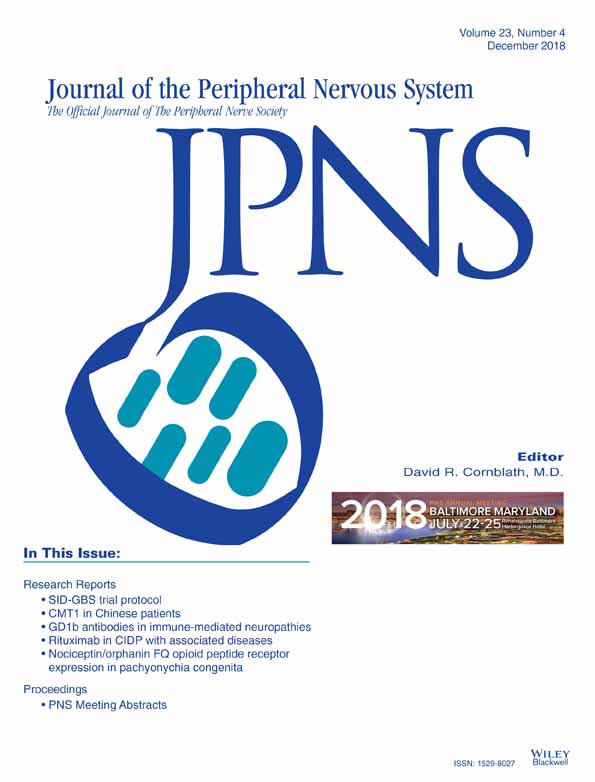Clinical relevance of serum antibodies to GD1b in immune-mediated neuropathies
Abstract
Antibodies to the ganglioside GD1b have been reported in various forms of immune-mediated neuropathy, but their clinical relevance for diagnosis and prognosis is unknown. We investigated the prevalence of anti-GD1b antibodies in acute and chronic immune-mediated neuropathies, and the clinical presentation and outcome in Guillain-Barré syndrome (GBS) and Miller Fisher-GBS overlap syndrome (MF-GBS). Anti-GD1b, anti-GM1 and anti-GQ1b antibodies were tested in serum of patients with GBS (N = 165), Miller Fisher syndrome (N = 10), MF-GBS (N = 28), monoclonal gammopathy of unknown significance neuropathy (MGUS; N = 101), chronic inflammatory demyelinating polyneuropathy (N = 29), paraneoplastic syndrome with anti-Hu-associated neuropathy (PNS; N = 11), other auto-immune diseases (AID; N = 60), and healthy controls (HC; N = 60). All samples were tested by enzyme-linked immunosorbent assay according to the Inflammatory Neuropathy Cause and Treatment protocol. IgM anti-GD1b antibodies were found in GBS (N = 4; 2.4%), MGUS (N = 3; 3.0%), and PNS patients (N = 1; 9.1%). IgG anti-GD1b antibodies were found in GBS (N = 20; 12.1%) and MF-GBS (N = 4; 14.3%) patients, but not in the AID and HC group. In the combined group of MF-GBS and GBS patients ((MF-)GBS), 14/36 (38.9%) patients with IgG anti-GD1b antibodies also had IgG anti-GM1 antibodies, and IgG anti-GD1b and IgG anti-GQ1b antibodies were found in 3/29 (10.3%) patients. Patients with (MF-)GBS and anti-GD1b without anti-GM1 antibodies did not differ regarding sensory disturbances or disease severity but recovered faster regarding the ability to walk independently compared with patients without anti-GD1b antibodies (P = 0.031) and with patients with both anti-GD1b and anti-GM1 antibodies (P = 0.034). In conclusion, testing for anti-GD1b antibodies may identify a specific group of immune-mediated neuropathies and (MF-)GBS patients with only anti-GD1b antibodies tend to recover faster.




